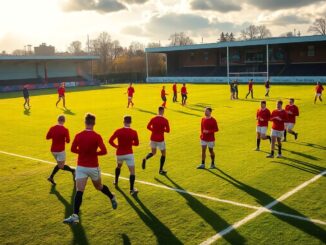This summer, Arsenal's transfer strategy hinges on Gabriel Martinelli's future as they seek to bolster their squad for a new title challenge.

Topics covered
In the ever-evolving world of football transfers, a single decision can dramatically shift the balance of power. Arsenal is gearing up for an exciting season, especially as they chase a coveted title, but there’s one player whose future could determine their trajectory: Gabriel Martinelli.
With the Gunners eyeing several new signings, the burning question is: can they truly push forward if they keep their Brazilian star?
Diving Into the Numbers
Arsenal is reportedly targeting around five key signings this summer—a strategy born out of necessity after a rather disappointing season.
The departures of seasoned players like Jorginho and Thomas Partey have left noticeable gaps in the squad. Yet, when you analyze the team, Martinelli’s role becomes critical. With a contract that runs until 2027, his position at the club seems secure, but his performance has sparked quite a debate.
Last season, Martinelli tallied 10 goals and eight assists over 51 appearances. While those figures are commendable, they do raise some eyebrows regarding his consistency and overall impact. In a competitive league like the Premier League, every player needs to deliver their best, and let’s be honest—the churn rate for underperforming players is notoriously high. The numbers tell us that if Martinelli doesn’t step up his game, Arsenal might have to look for other options.
The chatter about potential replacements is very telling. Names like Nico Williams and Rafael Leão are making the rounds, indicating that the club isn’t just sitting back, waiting for Martinelli to find his form. Instead, they seem to be adopting a proactive strategy that could significantly alter their attacking dynamics.
Learning from the Past: Successes and Failures
When diving into the transfer market, it’s crucial to reflect on previous successes and failures. Take Chelsea, for example. Their recruitment strategy in recent years has shown both the allure and risks of chasing big names without a solid plan. Arsenal must sidestep these pitfalls. If they decide to pursue a player like Rodrygo while keeping Martinelli, they might end up with a congested squad where players struggle to find their groove.
Moreover, look at Bukayo Saka—a shining success story who has emerged as one of Europe’s top talents. His journey underscores the importance of balanced development among teammates. Arsenal needs to ensure that any new signings enhance their existing talent rather than complicate team chemistry.
History has proven that teams often stumble when they prioritize star power over synergy and product-market fit within their squad. Arsenal must be cautious; balancing the retention of a player like Martinelli while strengthening their left flank is delicate work.
Key Takeaways for Founders and Product Managers
As we unpack Arsenal’s situation, there are valuable lessons for founders and product managers alike. The alignment of team capabilities with market needs can’t be overstated. Just as Arsenal evaluates Martinelli’s fit within their long-term vision, founders should ensure their teams are positioned to meet user demands effectively.
Data-driven decision-making is crucial. Just as Arsenal’s management scrutinizes performance metrics, founders should harness growth data to guide their strategies. Understanding churn rates, lifetime value (LTV), and customer acquisition cost (CAC) can steer product development and marketing in the right direction.
Adaptability is another essential lesson. If Martinelli stays and continues to struggle, Arsenal must be ready to pivot their strategy. Similarly, startups should remain flexible and prepared to adjust their product offerings based on market feedback.
Actionable Insights
For those keeping a close eye on Arsenal’s off-season, this summer will be pivotal. Will they make the bold moves necessary to build a title-contending squad? Much depends on Martinelli’s future. For entrepreneurs, the parallels are clear: prioritize product-market fit, make data-informed decisions, and stay adaptable. In a fast-changing landscape, these principles will lead to sustainable growth.
Ultimately, Arsenal’s transfer strategy mirrors a broader truth in business: success is often determined not just by individual talent, but by how well that talent integrates into a cohesive, forward-thinking vision.




